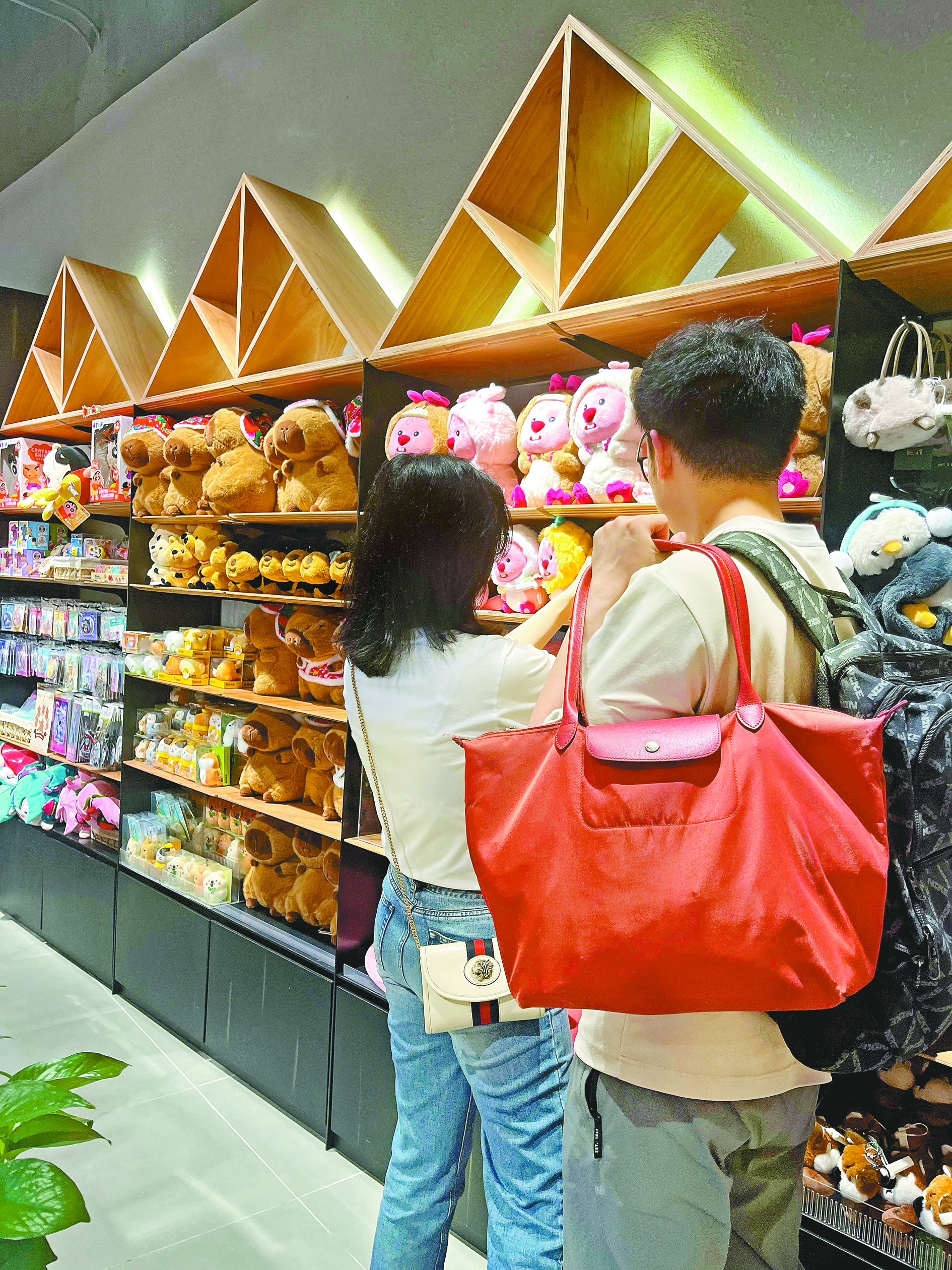Plushie craze: Can soaring prices buy emotional support?
Writer: Liu Yangyang | Editor: Lin Qiuying | From: Shenzhen Daily | Updated: 2024-08-06
In recent years, stuffed animals inspired by characters such as LinaBell, the adorable and intelligent fox from Disney, Lotso, the antagonistic bear from “Toy Story 3,” and Loopy, the pink beaver from the Korean animated series “Pororo the Little Penguin,” have gained popularity among young people.
This trend has resulted in a dramatic increase in the prices of certain plushies, with some selling for more than 10 times their original value.

A woman is attracted by the Loopy plush toys at a store in KK Mall in Luohu District. Liu Yangyang
High prices but still popular
These toys share a common feature — they possess human-like qualities such as distinct personalities, emotions, and the ability to mimic human behaviors. This aspect greatly appeals to young buyers. Despite their steep prices, ranging from a few hundred to several thousand yuan, they continue to be bestsellers and remain in high demand.
For example, the eggplant plush toy from Jellycat, a popular British brand, gained immense popularity due to its versatile photo opportunities for creating emojis depicting various emotions. This led to supply shortages and a surge in prices.
Numerous social media posts show people engaging with their toys. Owners commonly give their toys names, dress them up, and include them in various aspects of their lives such as traveling, working, and dining. They share these moments online.
On Douban, a Chinese social networking site, there are discussion groups like “Furry toys have a life too” and “What’s your IKEA shark doing today?” that collectively have more than 140,000 members. Many Douban users recommend their favorite plush toys, share their daily interactions with them, and even view these toys as their pets.
The newly launched Chiikawa-themed temporary store at the COCO Park shopping mall in Futian District has drawn a large crowd of young people. Chiikawa is a Japanese manga series by Nagano.
Deng Ying, a junior at Shenzhen University, waited in line for half an hour to buy her favorite plush toy from the store. “If I get the opportunity to study abroad, I will undoubtedly bring my Chiikawa along with me,” said Deng.
When she started university, she brought an IKEA shark named Wuwu to accompany her in the dormitory, chat with her, and help her sleep. “I’m going to pick a Chiikawa plush toy to study with me at the university library,” Deng added.
Some collectors are also involved in price speculation. For instance, plushie enthusiast Zhang Yangyang observed that a 47-cm Barcelona bear toy from Jellycat was priced at 279 yuan (US$38.98) in 2017, but has risen to 480 yuan this year and is often sold out. “On second-hand platforms, a price of 350 yuan for this toy can draw in numerous potential buyers,” Zhang said.
In addition, the retirement policies of some brands render specific toys as limited editions, consequently boosting their market value.
“I bought a Christmas-themed LinaBell ornament for 129 yuan in 2021, and it now sells for over 1,600 yuan on second-hand platforms. Even at this high price, the item still attracts considerable interest,” said Zheng Xiaoyu, a collector of LinaBell products.
Emotional support
During this year’s June 18 shopping festival, sales of plushies on Tmall, one of China’s largest e-commerce platforms, increased by 37.3% year on year.
According to the China Toy and Baby Products Association, consumers born after 2000 are the largest group of plushie buyers, accounting for 43% of the market. Consumers born in the 1990s follow closely at 36%. The Tmall 2023 Toy Trends Report shows that young consumers increasingly view plushies as companions and sources of emotional support.
Wang Liufeng, a member of the Psychological Counseling and Psychotherapy Committee of the Chinese Psychological Society, explained that plushies have unique psychological effects.
“The soft texture and adorable appearance of plushies can trigger feelings of comfort and provide emotional reassurance,” said Wang.
“In today’s fast-paced, high-pressure life, many young people often encounter feelings of loneliness and anxiety. This has contributed to the growth of the self-care industry. Plushies serve as a source of comfort and companionship, helping with stress relief and emotional fulfillment,” said Wang Zhiying, head of the Mental Health Department at Luohu District Mental Health Center.
“Plushies are typically soft and comforting, offering visual and tactile enjoyment. They can help people relax amid busy schedules.”
Li Yuanlin, director of the Student Growth Promotion Center at Futian Middle School, said that these toys serve as a suitable outlet for negative emotions.
“They are relatively easy to keep and accept emotions unconditionally. However, while these toys can have a calming effect, their efficacy in addressing personal psychological issues may differ. It’s important for consumers to make rational decisions when considering these purchases,” Li said.